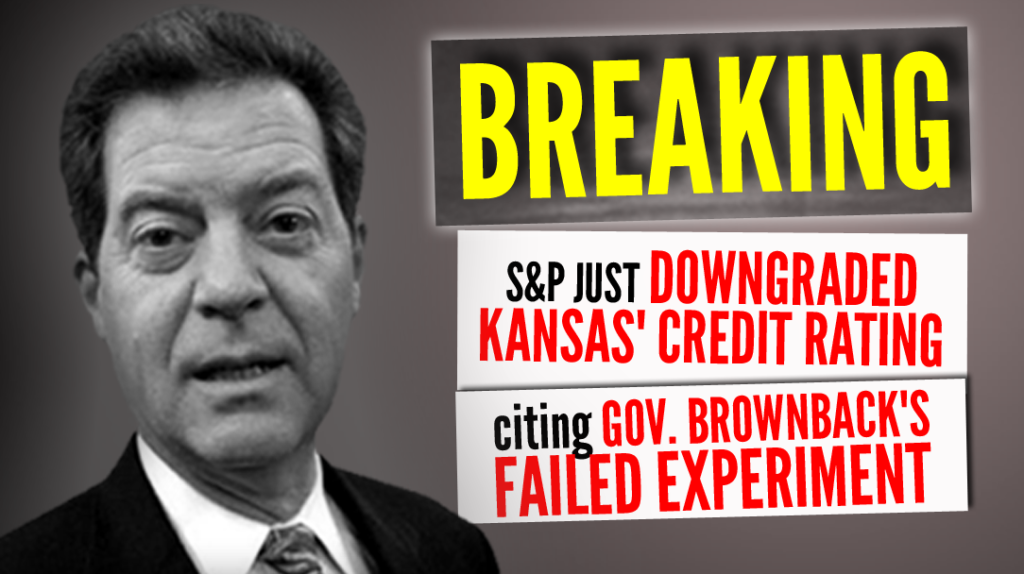Kansas is currently in a sad state economically by all accounts.
Kansas Failed Experiment
I read an article on Mother Jones recently titled “A Brief History of How Kansas Republicans Destroyed Their State” that gave the chronology Kansas’ economic destruction. They subtitled it, ‘Kansas experiment in small government created a big mess. The first paragraph of the article said it all.
In 2012, Kansas Gov. Sam Brownback launched a “real live experiment” in conservative governance. He slashed income taxes for top earners and eliminated them for more than 330,000 small businesses, promising the cuts would be “a shot of adrenaline into the heart of the Kansas economy.” Instead, the result has been disastrous. By the end of 2015, the state had lost nearly $3 billion in revenue and was behind most other states in job growth. And when the courts challenged the constitutionality of the bare-bones budgets, Brownback and his allies launched an all-out war on the state’s judges.
The article also gives a chronology of Brownback’s attempt to make the court his puppet by threatening its funding.
How bad has the conservative economic ideology been? Real bad.
- According to the Congressional Joint Economic Committee, in 2015, private-sector employment in Kansas grew by 9,400 jobs, an average of 780 jobs per month. This represents a slowdown in job growth from the 1,580 jobs per month added in 2014. In December, Kansas businesses added 1,800 jobs. Remember, in the U.S economy that created 2.6 million jobs, Kansas got a measly 9400.
- The U.S. Department of Commerce data point out that prior to Brownback’s tax cuts, Kansas ranked 12th in the nation in personal income growth; after the tax cuts, it fell to 41st.
- The school system is starving for revenues. Many are forced to close early.
- Kansas Center for Economic growth released a report that said the following.
When it comes to jobs and income tax revenue, Kansas is the flip side of its neighbors. Kansas’ job growth is behind the region and, compared to the period before the tax cuts, our income tax revenues haven’t recovered. Meanwhile, the region sees healthy growth. This matters because we were told revenue losses from the tax cuts would be recovered by explosive job creation.
Kansas’ fiscal faultiness is of its own creation. Other states aren’t experiencing it. That fact, however, has not stopped attempts to make such a claim. Relative to the first three-quarters of the year before the tax cuts went into effect (2012), Kansas’ experience couldn’t be more different from the rest of the region.
Neighboring states have had more income tax revenue to make the public investment that improves quality of life. They’ve been able to support schools, safe communities, health care, roads, and other essentials. Kansas, meanwhile, is seeing income tax revenue 11.6% below before the tax cuts were enacted.
The kicker to all this lost revenue is that it was done in the name of making Kansas the place for jobs and economic opportunity. What has transpired since the tax cuts has been anything but. Whether looking at private-sector job growth or all job growth, Kansas is getting beat. In the six-state region (which includes Arkansas, Colorado, Iowa, Missouri, Nebraska, and Oklahoma), Kansas is second from the bottom in both total and private job growth since the tax cuts went into effect. According to proponents of the tax cuts, this wasn’t supposed to happen. Our revenue problems were supposed to be temporary, once steroidal job growth hit the state. Instead, Kansas is coming close to scraping the bottom of the barrel – both on state finances and job creation.
Supply-side economics, voodoo economics, trickle-down economics or whatever you want to call it has never worked. Ronald Reagan’s economy was built on a subliminal Keynesian economy shrouded by debt, the semblance of a recovery. This was articulated best by Texas Senator Lloyd Bentsen when he said, “If you let me write $200 billion of hot checks every year, I could give you an illusion of prosperity, too.”
Kansas had the opportunity to change course back in 2014. In fact, Democratic candidate Paul Davis was in the lead right up to the election. But polls do not matter. Voters do. And most Kansans did not come out to vote. In effect, they voted for Brownback’s policies with their absence from voting.
Viewers are encouraged to subscribe and join the conversation for more insightful commentary and to support progressive messages. Together, we can populate the internet with progressive messages that represent the true aspirations of most Americans.
